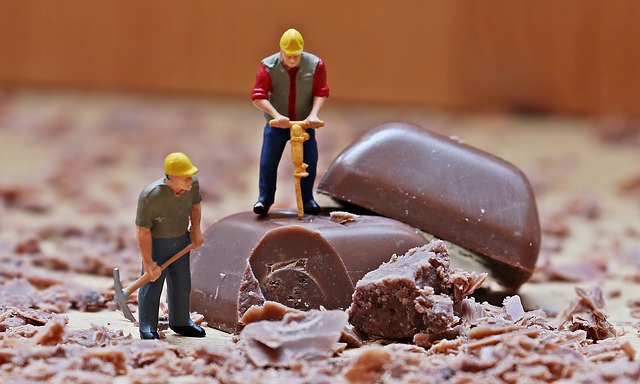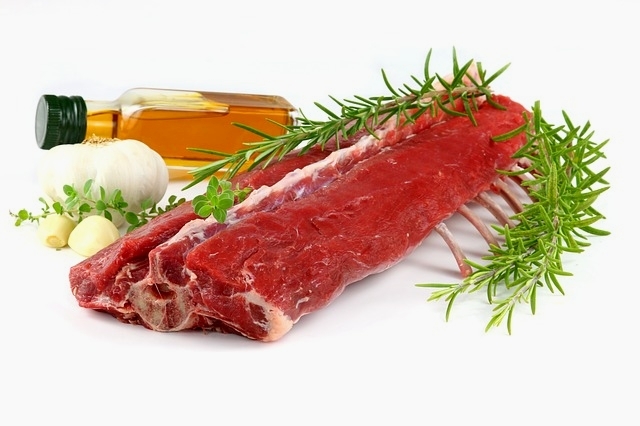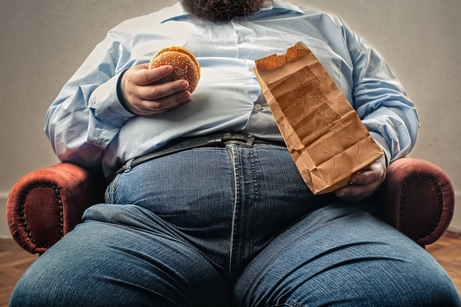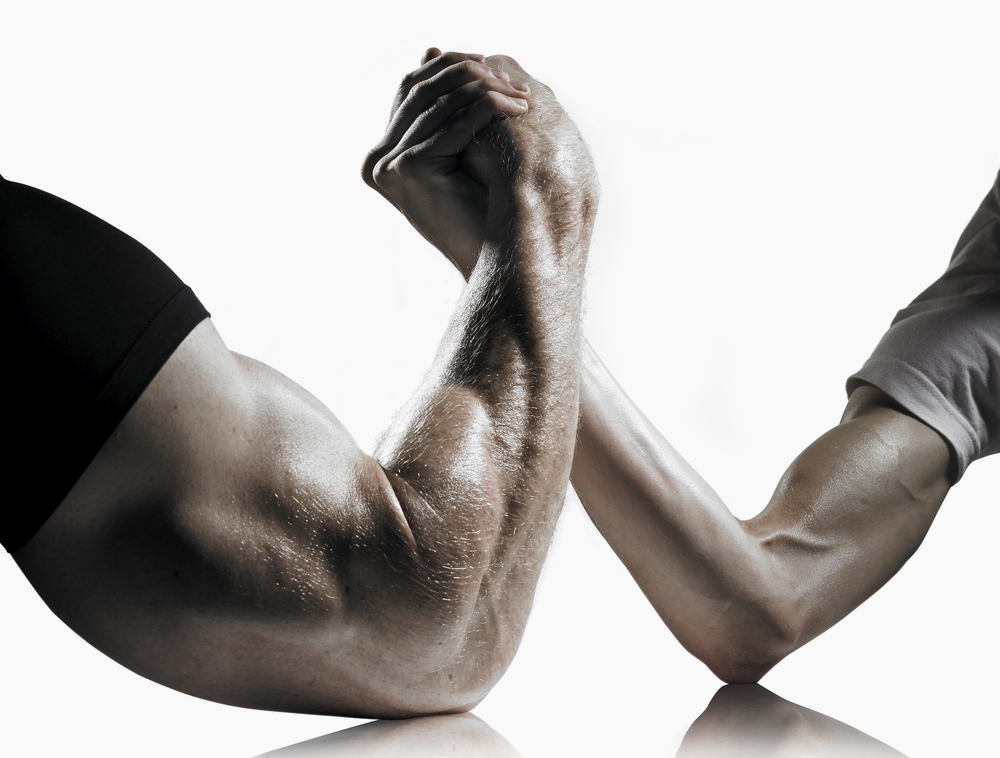If a theory contains words that sound educated, such as caloric deficit and caloric surplus, it doesn’t mean it’s correct.
That’s a very popular theory, saying that if you have a calorie surplus or take more calories than you burn – you’ll gain weight, and if you have a calorie deficit or you eat less calories than you burn – you’ll lose weight.
This theory goes so far as to say that to increase muscle mass you must be in a caloric surplus.
To group protein, fats, and carbohydrates under the same title “calories” is the same as saying that to build a wall you need a “substance”.
The theory suggests that whatever you put into that substance doesn’t matter, a calorie is a calorie. That’s not true.
In the real world, there is something called hormones. And results.
If all the calories had equal effect on the body and if we didn’t have hormones, this equation would have been 100% correct.
Thus what we are interested in here – reality – the correctness of this equation varies from 0% to 100%. That’s too great a variable to even consider such an equation at all. However modern trends dictate accepting generalized theories and opinions without looking at the facts. And then debating among already bad results.
The body does not treat all food calories equally.
Otherwise, there would be no difference if you got 2000 calories from cakes, oats, and soft drinks or from meat and healthy fats.
Will the effect be the same if you ate:
100 grams of chocolate (580 calories), compared to
200 grams of chicken meat (400 calories) + 20 grams of oil (180 calories)?
The effect of the chocolate:
 – It will spike your insulin. Insulin will then go into removing sugar from the blood. A part of this sugar will be used for momentary energy requirements. Another part will get stored in your liver and muscles (if there is any space left). The rest will be turned into fat and stored as body fat. Insulin will happily collect the fats to store them. (But isn’t triggered by them).
– It will spike your insulin. Insulin will then go into removing sugar from the blood. A part of this sugar will be used for momentary energy requirements. Another part will get stored in your liver and muscles (if there is any space left). The rest will be turned into fat and stored as body fat. Insulin will happily collect the fats to store them. (But isn’t triggered by them).
– You can experience a momentary increase in energy followed by a drop at a lower level than before you ate the chocolate. You could experience tiredness and irritability.
This means that blood sugar has dropped after a few hours and you experience a “hunger” for carbs – which isn’t a real hunger but a craving induced by a sudden drop in blood sugar. Sugar drops if it was previously elevated. “I feel shaky.”
– It will suppress the release of the hormone glucagon. This will prevent burning the excess of body fat and put the body into fat-building mode.
– It will hinder growth hormone secretion and thus lower your muscle growth and fat-burning potential.
The effect of the meat and oil:
 – It will raise glucagon which in the absence of carbs will have to start emptying the sugar stores in the liver and muscles. If you continue eating this way, then, after emptying the sugar stores, the body will have to use dietary and body fat.
– It will raise glucagon which in the absence of carbs will have to start emptying the sugar stores in the liver and muscles. If you continue eating this way, then, after emptying the sugar stores, the body will have to use dietary and body fat.
– Switching the body to a fat-burning regime, instead of sugar-burning.
– Growth hormone will increase along with all its benefits.
Of course, the effects of these two examples depend upon more factors, such as your body structure, health condition, activity, your overall diet.
The real question is what will the body do with the calories we eat. And what are the effects of each one of the three types of calories? The caloric deficit and caloric surplus theory does not differentiate between calories, i.e. their effects.
Thinking in terms of “calories” can be misleading. Every kind of food has a caloric value. And bricks have a caloric value. And muscles too. But bricks are used to build. Likewise, proteins have a caloric value but under the right conditions, they are mainly used as a building material.
Proteins have calories but they are mainly not intended to be used as a fuel. They are intended to serve as building blocks!
When protein will not be maximally used as a building material:
.
-
Too high intake of carbohydrates.
This will increase blood sugar which directly hinders growth hormone. The human growth hormone is one of the hormones that give the order that protein be built into muscles. If there is not enough growth hormone, there isn’t enough protein synthesis (building of muscle). And what happens? There remains an excess of protein that will be converted to glucose or fat and part of it excreted. “It’s going very slow.”
-
Minimal intake of carbohydrates with inadequate fat intake.
In this case, the body doesn’t have an adequate source of energy – fats – and starts converting part of the protein into glucose instead of embedding it into muscle. Fats are the buffer that prevents the use of protein as a fuel material (in the absence of carbs). “I feel tired without carbs.”
-
Low-intensity workouts.
In this case, the body doesn’t increase the release of growth hormone and doesn’t have enough stimuli to heal the exercise-induced (if at all) microtears through protein synthesis. There won’t be increased testosterone either after your workout. “It’s genetic.”
-
Too much exercise or overtraining.
 The body will be in a state of increased cortisol secretion which directly lowers testosterone and growth hormone levels. Testosterone along with HGH induces protein synthesis. Lowered testosterone = lower protein synthesis. Additionally, cortisol increases the cells’ resistance to insulin. This means that insulin at normal levels can’t adequately get inside the cells to do its job. The body will start releasing more insulin because the cells resist it. Increased insulin will result in decreased growth hormone. Hormones are interconnected systems. “I lose motivation to work out.”
The body will be in a state of increased cortisol secretion which directly lowers testosterone and growth hormone levels. Testosterone along with HGH induces protein synthesis. Lowered testosterone = lower protein synthesis. Additionally, cortisol increases the cells’ resistance to insulin. This means that insulin at normal levels can’t adequately get inside the cells to do its job. The body will start releasing more insulin because the cells resist it. Increased insulin will result in decreased growth hormone. Hormones are interconnected systems. “I lose motivation to work out.”
Directing hormones
With proper nutrition, proper training, and adequate sleep – your body will treat proteins as a building material. Bonus, this burns excess body fat. It only takes place if hormones are properly directed.
Dietary fats do not elevate insulin by themselves. Carbs do. Proteins cause a rise in insulin too but not as much as carbs do. If you get 200 calories from carbs, insulin will rise dramatically. If you get 200 calories from just protein without fats, insulin will rise but not dramatically.
Insulin doesn’t wait to do a calculation at the end of the day to see if you’ve been in a “surplus” or “deficit”. It acts immediately.
Insulin is not a “bad” hormone. Frequently high insulin is a bad condition. Carbs are not the only thing from food that causes insulin spikes. We’ll talk on another occasion about this.
By getting a good amount of protein and fats during the day (minimal carb intake, 40 grams max) your body will function differently and it will use calories differently. Even if you don’t exercise. This way of dieting is infinitely better than carb-dense diets even for a person that doesn’t work out. But training and nutrition complement each other and their effect, body and health-wise is greater by far.
An example
 Take an overweight person who doesn’t have much activity. If he gets 3000 calories through lots of carbs, some proteins, and some fats, his body will continue to store. Result? No energy. He will feel tired. His body will create and store fat. And we could say he is in a calorie surplus because he gets more than he burns.
Take an overweight person who doesn’t have much activity. If he gets 3000 calories through lots of carbs, some proteins, and some fats, his body will continue to store. Result? No energy. He will feel tired. His body will create and store fat. And we could say he is in a calorie surplus because he gets more than he burns.
If the same person gets 3000 calories through fats, a moderate amount of protein, and very little carbs, his body will treat those calories entirely differently. Result? More energy. The body will produce energy instead of storing it. Alertness. His body will work towards burning the extra body fat. This alone could contribute to a drastic difference in his energy level. You might say that he is in a caloric surplus because he is eating more than he is expending, but that would not be true because the degree of caloric expenditure is not the same in these two examples, but drastically different. As of the changes in diet, his body in the latter example is not oriented to storage. There will therefore be more material for tissue repair and a greater inclination to expend dietary fat and body fat. This leads to weight loss even though the calories are the same as in the bad diet example. One of the weight loss effects is appetite regulation.
And if he were to start working out regularly, he would build muscle mass while burning fat, regardless of whether someone thinks it’s a DEFICIT or SURPLUS!
What do we eat and in what ratios, is much more important than how much do we eat.
Conclusion
Caloric deficit and caloric surplus do not depend only upon food intake and physical activity, meaning how much we burn.
We can conclude that elevated insulin is apt to create momentary calorie surplus because it activates storing. How the body will utilize the intake of calories depends upon what kind of hormonal environment you provide it with.
You are trying to do a cleanup at home of unnecessary stuff with a family member who is apt to keep things. “We might need it” (same goes insulin). You are active and throwing things away but he’s focused on seeing what he can keep. So you are doing one thing and he does another. No matter how much you’re active, insulin will store if constantly elevated because of carbohydrates and other reasons.
We work out to create a need for the body to repair using the building material. And it’s not just repairing. The body will strengthen what it has repaired so it can sustain lesser “damage” next time. If this is accompanied by practicing the principles of weight training, enough sleep, and proper nutrition, you’ll have muscle growth without the accumulation of fat.
The caloric deficit and caloric surplus theory does not belong to a muscle-growth equation. It belongs in the category of idle talk.
Here is the equation of how muscles grow.







